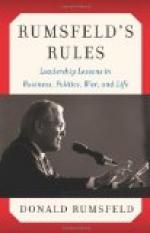The fighting in the Free State and in Natal has been simultaneous, and it may be worth while briefly to review the two campaigns. Lord Roberts set out from Modder River on Monday the 12th. On that day began the march of his force to the attack of Cronje. French with the cavalry seized Dekiel’s Drift on the Riet and was followed by two infantry divisions. Next day, Tuesday the 13th, French was holding the drifts of the Modder, and on Thursday morning the sixth division was at Klip Drift. Thereupon French pushed on with his cavalry to Kimberley. The same night Cronje marched off between Kimberley and Klip Drift, making eastwards along the north bank of the Modder, which he was to cross near Paardeberg. But his march was discovered. He was followed and attacked on Friday the 10th by the advance guard of the sixth division, which detained him at the crossing of the river. The Highland Brigade made a forced march to intercept him on the south bank, and between Friday and Sunday, the 16th and 18th, he was surrounded and driven back into a position formed by the river banks. Here, from the 17th to the 27th, he held out against a bombardment, while the British forces, pushing their trenches gradually nearer, were preparing for an assault. Lord Roberts had brought up the bulk of his force, and parried with ease the attacks of two or three parties of Boers who came up in succession to Cronje’s assistance; some of them having been sent for the purpose from Northern Natal. On Tuesday, February 27th, the anniversary of Majuba, Cronje surrendered.
The effects of this campaign against Cronje were felt at once in various parts of the theatre of war. The advance of Lord Roberts and the retreat of Cronje carried with them the relief of Kimberley. It drew away the Boers from the Colesberg district, so that on the 26th General Clements was able to enter Colesberg, which had been evacuated, and on the 27th, to move his troops forward from Arundel to Rensburg.
Lord Roberts had arranged for other action simultaneous with his own. On Friday, the 16th, General Brabant with his Cape Mounted Division attacked the Boers near Dordrecht and defeated them. A week later he was in Jamestown, the Boers were retreating towards the Orange River, and the rebels in Barkly East were asking for terms, receiving the answer that there were no terms but unconditional surrender.
On Wednesday the 14th, while French was leading the advance from Dekiel’s Drift to the Modder, Sir Redvers Buller took Hussar Hill, north-east of Chieveley. Four days later, on Sunday the 18th, he fought a considerable battle at Monte Cristo, a point of the Inhlawe range, the capture of which turned Hlangwane Hill and led to its capture next day, Monday the 19th. On Tuesday the 20th, Buller’s advance guard crossed the Tugela near Colenso. On Wednesday the 21st, the river was bridged, and three brigades crossed to the north bank. The fighting then became continuous.




